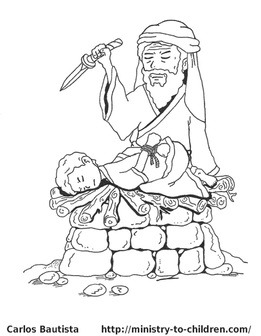Genesis 21:1-3; 22:1-14  A coloring page - Really??? A coloring page - Really??? Let me put my cards on the table - I've been preaching weekly for 8 years and I've never preached this text. Another card I've got is - I've been pastoring for 20 years and I have had dozens of conversations about this text with folks. This text is absurd at best; it's disturbing and unconscionable at worst. What kind of God tests someone by asking for a human father to sacrifice his only son? What kind of horrific father was Abraham anyway? And Isaac? What became of him after this psychologically damaging event in his life? And don't get me started about Sarah. Where was she? We're still reading, interpreting and commenting on this text as if the literal story must teach us a moral lesson. We're still reading, interpreting and commenting on this text as if the presenting story teaches us something about God, about humans, about family values. The only sermons I've ever heard about this text leave us with the obvious Christian theological lesson - Abraham sacrificing Isaac is a foretelling of God sacrificing Jesus. I can't preach it this way for two reasons. First, I typically honor the Hebrew scriptures by keeping them true to themselves without inserting the Christian scriptures and their meaning. Second, I have a problem with violent atonement. The idea that God would require a human sacrifice is - foul. When Abraham had the thought that God wanted him to sacrifice his son, why didn't he recognize it as foul? And when Sarah heard about it, why didn't she tell someone that her husband had gone mad. And then why didn't she pack her and Isaac's bags and run away? When Isaac realized his dad was going to do him harm, why didn't he overpower his father and since he didn't, can we assume that he'd been abused by his father for so long that he had lost his voice? If you're still reading - you may be quite irritated by my lack of respect to the patriarch. I'm asking these questions because I find them to be lacking in the discussion. Instead of shaking our head in disgust and picking at the text in the critical manner we usually do, we approach the text with our preconceived notions. We have already decided that God is good and it taints our ability to see this text for what it is. Abraham is our patriarch; he too must have been a faithful person (after all Hebrews 11 says so). As a result, we overlook reasonable perspectives of this hideous story. We have already accepted that women and children have no say and so we perpetuate the hidden, abused, ignored, discarded voices in the scriptures. When you read this story, whose voice are you listening to?
5 Comments
Carole
9/14/2013 03:10:54 am
I remember as a child talking to my grandmother about just what you wrote there. Her response was that God was testing Abraham . . . and I remember my 8 yr old heart burning with hurt at the whole story. I did ask God about this and I didn't understand at all. Nonetheless, I was taken to church activities and continued my relationship with God. I put this on the back burner like I have many things that i don't understand about God. It was not until I was in my mid 20s when I picked up my uncle's bible and read his note in the margin "God spared Abraham the pain of doing this but He did not spare Himself as He freely gave His own Son in payment for our sins. God was determined to have a covenant with Abraham so what does He do? He walks the covenant with Himself! So goes the Christian life - anything that God wants to do, we need to get out of the way and allow Him to do. Abraham's story is a picture of future events. Blood is required for sin. It should hurt. My reaction as a child was accurate. We should be violently upset! Ultimate lesson: there is nothing God won't do to be in relationship with His creation.
Reply
Jim
6/26/2014 03:49:41 am
First, God did not allow Isaac to die, nor does God expect Isaac to die. Second, Abraham was a sacrifice from the beginning: a worshipper of the Moon in a religion that routinely sacrificed young men to keep the seasons going, sacrificing Sarai to Pharaoh to save his own neck (it was God who saved Sarai), and at the behest of Sarai, sacrificing his then "only son" to keep Sarai happy. So sacrifice was in his blood.
Reply
Beth
6/26/2014 07:02:29 am
Thanks for reading Jim. Your thoughts are wonderfully counter cultural in that if the other cultures were used to sacrifice in this way, God draws the line in opposition to it. God is showing Godself different than what the culture thought at the time.
Reply
Jim
6/26/2014 08:11:54 am
Thanks. I think it is counter-cultural for us, too. It says our sacrifices are not necessary to procure a future with God. God initiates the promise and goes all in to fulfill it. If this has any implications for the cross of Jesus it is not in the sacrifice of human beings. Remember God spared Isaac.
Beth
6/27/2014 03:11:06 am
Yes! I'm thinking of the book non-violent atonement. This passage in provides a great opportunity to teach violent atonement as something that God didn't want/ didn't need. I think bringing in the cross and the theology of sacrifice at a time other than Holy Week would be a great gift to your congregation!
Reply
Leave a Reply. |
Search this blog for a specific text or story:
I am grateful for
|

This work is licensed under a Creative Commons Attribution-NonCommercial-ShareAlike 3.0 Unported License.
